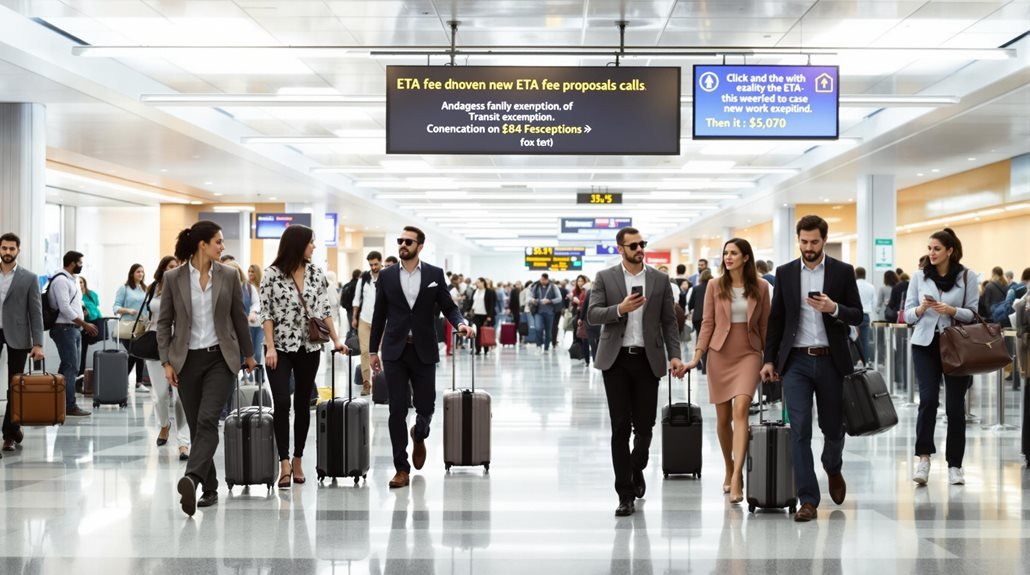The UK government has proposed an increase in the Electronic Travel Authorization fee, raising it from £10 to £16. This change, effective January 8, will primarily affect international travelers, including those from the U.S. Significantly, airside transit passengers are exempt. This shift, while accommodating certain travelers, invites scrutiny regarding its potential impact on the UK's attractiveness as a travel hub. The interplay between convenience and competitiveness raises critical questions about future travel dynamics.
Overview of the Proposed ETA Fee Hike
As the UK government moves towards implementing a proposed increase in the Electronic Travel Authorization (ETA) fee, the current rate of £10 ($12.28) is set to rise to £16 ($19.65) starting January 8 for most international travelers, including those from the United States.
This decision raises questions regarding the fee justification within the context of the ETA application process.
While the government cites the need for a secure and efficient digital immigration system, industry critics warn that this hike may hinder the UK's competitiveness as a travel destination.
Hence, potential visitors need to assess the impact of rising costs on their travel plans.
Exemptions for Airside Transit Passengers
The proposed increase in the Electronic Travel Authorization (ETA) fee has raised concerns among various stakeholders, highlighting the need for clear guidelines regarding exemptions.
- Airside transit passengers eligible for exemption
- Response based on aviation industry feedback
- Temporary exemption to ease passenger inconvenience
- Intended for those not passing through border control
This exemption aims to enhance passenger convenience, allowing travelers to transit through UK airports without the additional burden of an ETA fee.
Industry Response to the Fee Increase
Industry stakeholders have reacted sharply to the proposed increase in the Electronic Travel Authorization (ETA) fee, viewing it as a significant misstep in an already vulnerable tourism sector.
Critics argue that the fee justification lacks transparency and fails to address growing traveler concerns regarding affordability. Many industry leaders warn that escalating costs may deter potential visitors, undermining the UK's competitiveness as a travel destination.
This sentiment is echoed by figures like Willie Walsh of IATA, who has called for the government to prioritize cost-effective measures.
The proposed hike raises pivotal questions about the long-term sustainability of UK tourism amidst global competition.
Comparison of Global Electronic Travel Authorizations
Escalating fees for electronic travel authorizations, such as the UK's proposed increase to the ETA fee, have intensified discussions about the broader landscape of similar systems worldwide.
- The EU's ETIAS introduces a €7 fee.
- The U.S. ESTA charges a fee of $21.
- Canada's eTA incorporates a CAD $7 fee.
- Other nations are developing similar frameworks.
These contrasting immigration policies reflect global travel trends, balancing security with accessibility for travelers.
As countries navigate fee adjustments, their approaches highlight the complexities of fostering openness while maintaining robust border control measures in an increasingly interconnected world.
Impact on International Travelers and Trip Planning
Steering the implications of the proposed ETA fee increase presents a new challenge for international travelers planning trips to the UK.
As the fee rises from £10 to £16, effective January 8, budget planning becomes paramount; travelers must consider this additional expense in their travel costs. The exemption for transit passengers alleviates some concerns, yet overall, the fee hike may deter potential visitors, impacting the UK's tourism competitiveness.
Heightened traveler awareness regarding digital immigration requirements is essential for seamless trip planning, as shifts in costs and logistics necessitate adjustments to travel strategies and expectations for those considering a visit to the UK.
Frequently Asked Questions
How Can I Apply for the New ETA Online?
The ETA application process requires individuals to follow specific online submission guidelines. Applicants must provide personal information and travel details through an official platform, ensuring compliance with updated protocols for efficient processing and security.
Is There a Refund Policy for the ETA Fee?
The ETA refund process remains unclear, raising concerns for applicants. Without explicit guidelines, uncertainties persist regarding eligibility and conditions for refunds, highlighting potential application concerns that may deter some individuals from completing the ETA application.
Will Children Have to Pay the New ETA Fee?
The proposed ETA fee increase raises concerns about fee implications for families. While specific children exemptions remain unclear, potential charges could impact travel budgets, prompting families to reconsider international travel plans amidst rising costs.
Can I Use My Existing ETA After the Fee Increase?
The existing ETA remains valid despite the fee impact. Travelers can continue to use it without concern as long as it has not expired, allowing for seamless entry under current regulations amidst rising costs.
What Payment Methods Are Accepted for the ETA Application?
The accepted payment methods for ETA applications include various credit card options, providing flexibility. Additionally, payment alternatives such as electronic wallets may facilitate transactions, enhancing accessibility for diverse travelers in need of streamlined processing.
